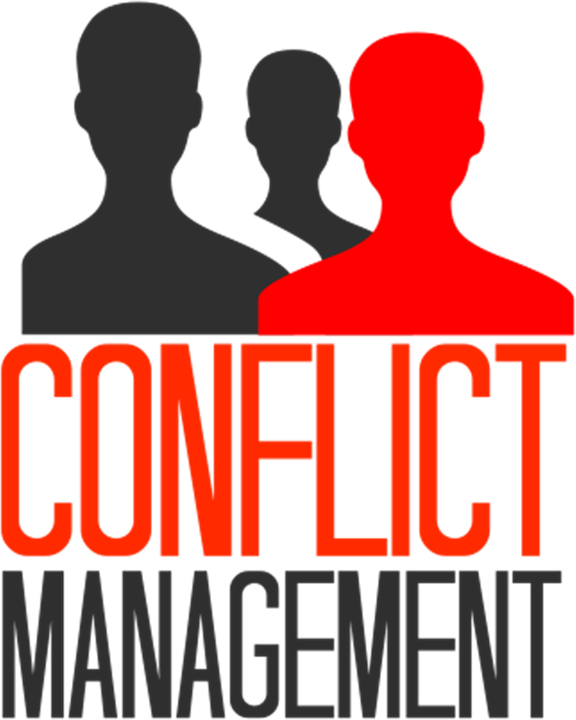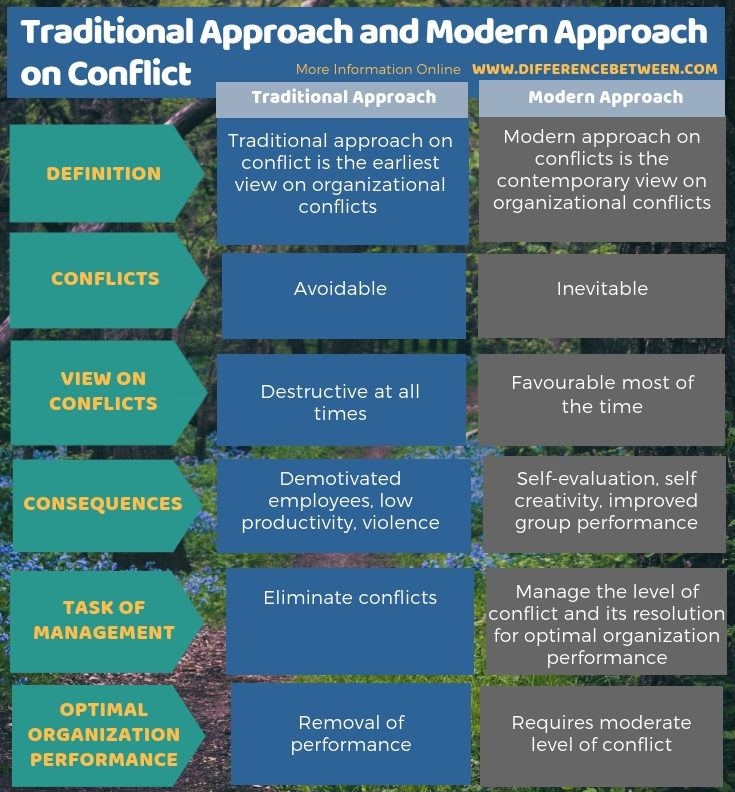Difference Between Traditional Approach and Modern Approach on Conflict
The key difference between traditional approach and modern approach on conflict is that the traditional approach of conflict considers conflicts as avoidable, whereas the modern approach of conflict considers conflicts as inevitable.
Conflict management is one of the key concerns in HR principles. It is the practice of being able to identify and resolve conflicts sensibly, fairly and efficiently. Conflicts are common in every workplace. Thus, managers should have the basic idea of managing conflicts. There are five conflict management styles: accommodating, avoiding, collaborating, competing and compromising. However, approaches and vision regarding conflicts changed with time.
CONTENTS
1. Overview and Key Difference
2. What is the Traditional Approach on Conflict
3. What is the Modern Approach on Conflict
4. Relationship Between Traditional Approach and Modern Approach on Conflict
5. Side by Side Comparison – Traditional Approach vs Modern Approach on Conflict in Tabular Form
6. Summary
What is the Traditional Approach on Conflict?
Traditional approach on conflict is the earliest view on organizational conflicts. It is the simplest approach for conflicts and was developed in the 1930s. In the past, the managers considered conflicts as evil, outright wrong, destructive and negative. Furthermore, managers wanted to avoid conflicts completely at their workstation as conflicts bring demotivated workforce, less productivity and dysfunctional work.

The traditional approach suggests that managers should manage the conflict by identifying the malfunctioning of causes. Further, the traditional approach of conflict emphasizes miscommunication, disagreement between employees, trust issues and irresponsibility of managers’ or company owners’ regarding the needs and expectations of employees.
What is the Modern Approach on Conflict?
Modern approach on conflicts is the contemporary view on organizational conflicts. The development and expansion of studies on organizational behaviour and HR methodologies challenge certain traditional approaches. Traditional approach on conflict was one such concept in HR.
Modern approach on conflict identifies conflicts as an important part of the organization. Moreover, it considers conflicts as favourable to the company and not to eliminate them at all. According to modern theories, if an organisation does not face any conflicts, the organization is unadaptable, non-flexible, non-responsive and static.
Conflicts are more favourable at the minimum level of it as it brings self-motivation, self-evaluation and creativity among individuals. It is due to the competition between each other. Also, it reflects better outcomes of tasks assigned, effective resolutions and improves group performance.

However, the modern approach on conflict does not always describe that all the conflicts are better and favourable. In other words, not all conflicts are beneficial and healthy. It clearly emphasizes that only functional and constructive forms of conflict support the organization, while the dysfunctional or destructive forms of conflict should always be avoided.
What is the Relationship Between Traditional Approach and Modern Approach on Conflict?
In any society, conflicts are natural and common when people have different ideas of work. The only difference is how we look at a conflict and manage it. Therefore, in both approaches, only the way we look at the conflict is different. As traditional approach describes, all conflicts should be avoided, and this is agreeable in modern approach up to a certain extent. However, dysfunctional and destructive type of conflicts should be avoided at all times.
What is the Difference Between Traditional Approach and Modern Approach on Conflict?
The key difference between traditional approach and modern approach on conflict is their view on conflicts. As per the traditional approach, conflicts are avoidable, but as per the modern approach, conflicts are inevitable. In the traditional approach, conflicts are considered destructive to the workplace while in the modern approach, conflicts are considered as a supportive element to a workplace.
Earlier, people believed conflicts would bring demotivated workforce, low productivity and violence to the organization. On the contrary, in the contemporary context, people believe conflicts can bring self-motivation, self-evaluation, improved group performance and self creativity to the workplace due to the competition among individuals.
Below infographic summarizes the difference between traditional approach and modern approach on conflict.

Summary – Traditional Approach vs Modern Approach on Conflict
The key difference between traditional approach and modern approach is that traditional approach considers conflicts as avoidable and destructive to an organization, whereas modern approach considers conflicts as inevitable and supportive to an organization.
Image Courtesy:
1. “3233158” (CC0) via Pixabay
2. “1181572” (CC0) via Pixabay
ncG1vNJzZmivp6x7pbXFn5yrnZ6YsqOx07CcnqZemLyue8OinZ%2Bdopq7pLGMm5ytr5Wau27A0ZqboqyZpLuiuIyap6mqn5awqXnAp5tmpZ%2BZsrO6jJqnqaqflrCpec6nZJynnpu5qq%2FTaA%3D%3D